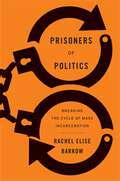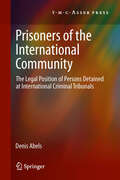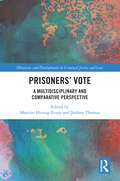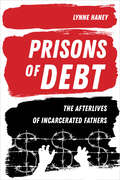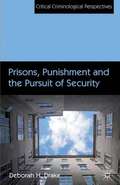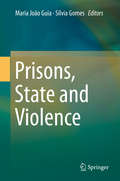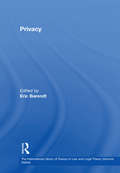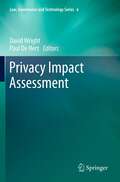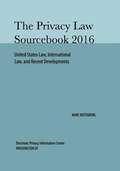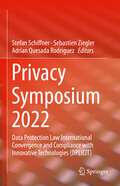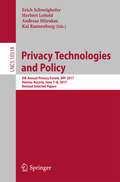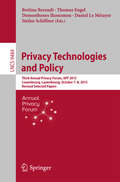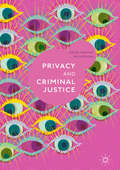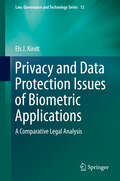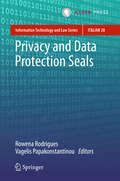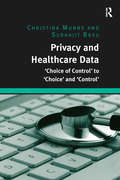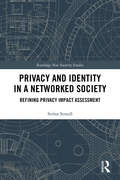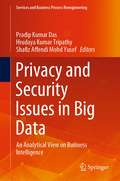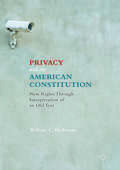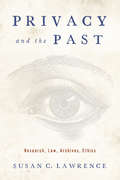- Table View
- List View
Prisoners of Politics: Breaking the Cycle of Mass Incarceration
by Rachel Elise BarkowAmerica’s criminal justice system reflects irrational fears stoked by politicians seeking to win election. Pointing to specific policies that are morally problematic and have failed to end the cycle of recidivism, Rachel Barkow argues that reform guided by evidence, not politics and emotions, will reduce crime and reverse mass incarceration.
Prisoners of the International Community
by Denis AbelsLittle has been written about the legal position and conditions of detention of persons detained by international criminal tribunals, particularly as regards their internal legal position (their rights and duties inside the remand facility). The primary purpose of this book is to set out the law governing the detention of persons detained under the tribunals' jurisdiction. The book provides a detailed account of this area of international criminal law. It sets out the applicable law, including the law's underlying principles, and focuses on a number of specific procedural and substantive legal issues. As to procedural issues, it examines the available complaints and disciplinary procedures as well as procedures applicable to the designation of States for the enforcement of the tribunals' sentences. In respect of substantive law, it examines the detainees' right to contact with the outside world, including contact with their relatives, with their lawyers and with the media. The book will be an extremely useful guidance for practitioners in applying the law and principles of the tribunals' detention law, particularly because it is the first monograph written on the topic.
Prisoners' Vote: A Multidisciplinary and Comparative Perspective (ISSN)
by Martine Herzog-Evans and Jérôme ThomasThrough different legal and criminological angles and perspectives, this book addresses the controversial question of whether prisoners should have the right to vote, as well as the optimal modalities for such a vote.By adopting a comparative approach to explore the legal systems of very different jurisdictions, such as the former Eastern Bloc, England, Ireland, the USA and France, the book reveals a recent trend in opening up the right to vote. It also looks at the recommendations of international and European institutions which, while relatively cautious, nevertheless support such progress. Examining the issue from a criminological viewpoint, the book investigates the role that prisoners’ votes could play in the social integration of these individuals into the community through political inclusion as citizens. Offering legal, theoretical and empirical bases, it blends a variety of perspectives to help readers establish an understanding of how prisoners' voting could contribute to improving their attachment to society and its values.Concise and direct, Prisoners' Vote will be of great interest to upper-level students and scholars of law, criminology, sociology, criminal justice, and political science. It should also appeal to practitioners working in the criminal justice system and policy makers reflecting on whether and how, to open the right to vote to prisoners.
Prisons of Debt: The Afterlives of Incarcerated Fathers
by Prof. Lynne HaneyA profound portrait of the hidden injustices that trap fathers in a cycle of punishment and debt. In the first study of its kind, sociologist Lynne Haney travels into state institutions across the country to document the experiences of the millions of fathers cycling through the criminal justice and child support systems. Prisons of Debt shows how these systems work together to create complex entanglements—rather than "piling up" in men's lives, these entanglements form feedback loops of disadvantage. The prison–child support pipeline flows in both directions, deepening parents' debt and criminal justice involvement. Through moving accounts of men struggling to be fathers from behind prison walls and under the weight of support debt, Prisons of Debt exposes how the criminalization of child support undermines the most essential of familial relationships. Haney argues that these state systems can end up producing exactly the kind of parent they fear and loathe: bitter, unreliable, and cyclical fathers. Based on observations of 1,200 child support cases and interviews with 145 indebted fathers in New York, California, and Florida, Prisons of Debt reveals the actual practices of child support adjudication and enforcement alongside the lived realities of fathers trapped in those systems. The result is a rigorously documented analysis of how poor men are too often denied their rights of citizenship and of fatherhood.
Prisons, Punishment and the Pursuit of Security
by Deborah H. DrakeDrawing on research in men's long-term, maximum-security prisons, this book examines three interconnected problems: the tendency of the prison to obscure other social problems and conceal its own failings, the pursuit of greater levels of human security through repressive and violent means and the persistence of the belief in the problem of 'evil'.
Prisons, State and Violence
by Maria João Guia Sílvia GomesThis book provides a unique analysis of prisons and the violence at work inside them. It not only addresses aspects such as racial discrimination, especially in US prisons, but also gender differences, specific criminal groups operating within prisons, the reintegration processes and its failures. Combining works by various authors, it presents diverse perspectives on prison violence: in countries ranging from the USA to Australia, crossing European countries such as Portugal and Spain, among others, but also specific aspects such as prohibitions on phone calls, the economic crisis, and the current challenges of mass incarceration. As such, it offers a broad overview of several problems relevant to all scholars interested in deepening their understanding of violence in prisons.
Privacy (The International Library of Essays in Law and Legal Theory (Second Series))
by Eric BarendtPrivacy is a complex and controversial right. The essays in this book address fundamental issues about its value and how best it may be defined. Some of them examine its importance and scope in the context of the information society in which both government and business acquire ever more knowledge about the conduct and attitudes of individuals. Others address the use of privacy to protect the rights of women and to protect individuals against the media.
Privacy (Wiley Blackwell Readings in Philosophy)
by Steven M. Cahn Carissa VélizAn incisive compendium of philosophical literature on privacy, part of the acclaimed Wiley-Blackwell Readings in Philosophy series Companies collect and share much of your daily life, from your location and search history, to your likes, habits, and relationships. As more and more of our personal data is collected, analyzed, and distributed, we need to think carefully about what we might be losing when we give up our privacy. Privacy is a thought-provoking collection of philosophical essays on privacy, offering deep insights into the nature of privacy, its value, and the consequences of its loss. Bringing together both classic and contemporary work, this timely volume explores the theories, issues, debates, and applications of the philosophical study of privacy. The essays address concealment and exposure, the liberal value of privacy, privacy in social media, privacy rights and public information, privacy and the limits of law, and more. Highlights the work of emerging thinkers and leaders in the subject Presents work from philosophers such as Judith Jarvis Thomson, Ruth Gavison, Thomas Scanlon, W. A. Parent, and Thomas Nagel Explores privacy in contexts including governance, law, ethics, political philosophy, and public policy Discusses data collection, online tracking, digital surveillance, and other contemporary privacy issues Edited by award-winning privacy specialist Carissa Véliz and renowned philosopher and author Steven Cahn, Privacy is a must-read anthology for philosophers, psychologists, sociologists, and advanced undergraduate and graduate students taking courses on digital and applied ethics, philosophy, media studies, communications, computer science, engineering, and sociology.
Privacy Impact Assessment
by David Wright Paul De HertVirtually all organisations collect, use, process and share personal data from their employees, customers and/or citizens. In doing so, they may be exposing themselves to risks, from threats and vulnerabilities, of that data being breached or compromised by negligent or wayward employees, hackers, the police, intelligence agencies or third-party service providers. A recent study by the Ponemon Institute found that 70 per cent of organisations surveyed had suffered a data breach in the previous year. Privacy impact assessment is a tool, a process, a methodology to identify, assess, mitigate or avoid privacy risks and, in collaboration with stakeholders, to identify solutions. Contributors to this book - privacy commissioners, academics, consultants, practitioners, industry representatives - are among the world's leading PIA experts. They share their experience and offer their insights to the reader in the policy and practice of PIA in Australia, Canada, New Zealand, the United Kingdom, the United States and elsewhere. This book, the first such on privacy impact assessment, will be of interest to any organisation that collects or uses personal data and, in particular, to regulators, policy-makers, privacy professionals, including privacy, security and information officials, consultants, system architects, engineers and integrators, compliance lawyers and marketing professionals. In his Foreword, surveillance studies guru Gary Marx says, "This state-of-the-art book describes the most comprehensive tool yet available for policy-makers to evaluate new personal data information technologies before they are introduced." This book could save your organisation many thousands or even millions of euros (or dollars) and the damage to your organisation's reputation and to the trust of employees, customers or citizens if it suffers a data breach that could have been avoided if only it had performed a privacy impact assessment before deploying a new technology, product, service or other initiative involving personal data.
Privacy Law Sourcebook 2016: United States Law, International Law and Recent Developments
by Marc RotenbergMore than a decade has passed since the last publication of The Privacy Law Sourcebook. Although much has happened in the privacy world, we remain committed to providing an accurate and timely collection of the main legal instruments for privacy protection in the modern age, as well as useful resources to aid further research.
Privacy Rights: Moral and Legal Foundations
by Adam D. MooreWe all know that Google stores huge amounts of information about everyone who uses its search tools, that Amazon can recommend new books to us based on our past purchases, and that the U.S. government engaged in many data-mining activities during the Bush administration to acquire information about us, including involving telecommunications companies in monitoring our phone calls (currently the subject of a bill in Congress). Control over access to our bodies and to special places, like our homes, has traditionally been the focus of concerns about privacy, but access to information about us is raising new challenges for those anxious to protect our privacy. In Privacy Rights, Adam Moore adds informational privacy to physical and spatial privacy as fundamental to developing a general theory of privacy that is well grounded morally and legally.
Privacy Rights: Moral and Legal Foundations
by Adam D. MooreWe all know that Google stores huge amounts of information about everyone who uses its search tools, that Amazon can recommend new books to us based on our past purchases, and that the U.S. government engaged in many data-mining activities during the Bush administration to acquire information about us, including involving telecommunications companies in monitoring our phone calls (currently the subject of a bill in Congress). Control over access to our bodies and to special places, like our homes, has traditionally been the focus of concerns about privacy, but access to information about us is raising new challenges for those anxious to protect our privacy. In Privacy Rights, Adam Moore adds informational privacy to physical and spatial privacy as fundamental to developing a general theory of privacy that is well grounded morally and legally.
Privacy Symposium 2022: Data Protection Law International Convergence and Compliance with Innovative Technologies (DPLICIT)
by Stefan Schiffner Sebastien Ziegler Adrian Quesada RodriguezThis book presents a collection of high-quality research works and professional perspectives arising from the call for papers of the Privacy Symposium 2022; an international conference aimed towards the promotion of international dialogue, cooperation and knowledge sharing on data protection regulations, compliance and emerging technologies. Gathering legal and technology expertise, this publication provides cutting-edge perspectives on the convergence of international data protection regulations, as well as data protection compliance of emerging technologies, such as: Artificial Intelligence, e-health, blockchain, edge computing, Internet of things, V2X and Smart Grids. It includes selected papers from the Privacy Symposium conference 2022 (PSC 2022) call for papers, encompassing relevant topics, including: international law and comparative law in data protection cross-border data transfers emerging technologies and data protection compliance data protection by design technologic solutions for data protection compliance data protection good practices across industries and verticals cybersecurity and data protection assessment and certification of data protection compliance, and data subject rights implementation This publication includes papers authored by academics and professionals involved on various areas of data protection, technical, legal and compliance services.Chapter 10 is available open access under a Creative Commons Attribution 4.0 International License via link.springer.com
Privacy Technologies and Policy
by Kai Rannenberg Erich Schweighofer Herbert Leitold Andreas MitrakasThis book constitutes the thoroughly refereed post-conference proceedings of the 5th Annual Privacy Forum, APF 2017, held in Vienna, Austria, in June 2017. The 12 revised full papers were carefully selected from 41 submissions on the basis of significance, novelty, and scientific quality. These selected papers are organized in three different chapters corresponding to the conference sessions. The first chapter, "Data Protection Regulation", discusses topics concerning big genetic data, a privacy-preserving European identity ecosystem, the right to be forgotten und the re-use of privacy risk analysis. The second chapter, "Neutralisation and Anonymization", discusses neutralisation of threat actors, privacy by design data exchange between CSIRTs, differential privacy and database anonymization. Finally, the third chapter, "Privacy Policies in Practice", discusses privacy by design, privacy scores, privacy data management in healthcare and trade-offs between privacy and utility.
Privacy Technologies and Policy
by Bettina Berendt Thomas Engel Demosthenes Ikonomou Daniel Le Métayer Stefan SchiffnerThis book constitutes the thoroughly refereedpost-conference proceedings of the Third Annual Privacy Forum, APF 2015, heldin Luxembourg, Luxembourg, in October 2015. The 11 revised full papers presented in this volume werecarefully reviewed and selected from 24 submissions. The topics focus onprivacy by design (PbD), i. e. the attempt to combine technical and organizationalmeasures to ensure the basic rights of the individual. The papers are organizedin three sessions: measuring privacy; rules and principles; legal and economicperspectives on privacy.
Privacy and Criminal Justice
by Terry Thomas Daniel MarshallThis book offers a comparison of the differences between the 'public' and 'private' spheres, and questions the need for law enforcement to intrude upon both. Beginning with the origins of the concept of privacy, before addressing more current thinking, the authors examine the notion of privacy and policing, using both direct (e. g. 'stop and search' methods) and technological interventions (e. g. telephone interceptions and Automatic Number Plate Recognition cameras), privacy in the space of the court, looking at what restrictions are placed on press reporting, as well as considering whether the open court ensures fair trials. Particular forms of offending and privacy are also considered: anonymity for sexual offence defendants, for example, or weighing the terrorist's right to privacy against the safety and security of the general public. A timely discussion into the right to privacy in prison and during community sentences is also included, and Marshall and Thomas offer convin cing analysis on the importance of rehabilitation, giving consideration to police registers and the storage and maintenance of criminal records by the police and their possible future use. A diverse investigation into the many facets of privacy, this volume will hold broad appeal for scholars and students of terrorism, security, and human rights.
Privacy and Data Protection Issues of Biometric Applications
by Els J. KindtThis book discusses all critical privacy and data protection aspects of biometric systems from a legal perspective. It contains a systematic and complete analysis of the many issues raised by these systems based on examples worldwide and provides several recommendations for a transnational regulatory framework. An appropriate legal framework is in most countries not yet in place. Biometric systems use facial images, fingerprints, iris and/or voice in an automated way to identify or to verify (identity) claims of persons. The treatise which has an interdisciplinary approach starts with explaining the functioning of biometric systems in general terms for non-specialists. It continues with a description of the legal nature of biometric data and makes a comparison with DNA and biological material and the regulation thereof. After describing the risks, the work further reviews the opinions of data protection authorities in relation to biometric systems and current and future (EU) law. A detailed legal comparative analysis is made of the situation in Belgium, France and the Netherlands. The author concludes with an evaluation of the proportionality principle and the application of data protection law to biometric data processing operations, mainly in the private sector. Pleading for more safeguards in legislation, the author makes several suggestions for a regulatory framework aiming at reducing the risks of biometric systems. They include limitations to the collection and storage of biometric data as well as technical measures, which could influence the proportionality of the processing. The text is supported by several figures and tables providing a summary of particular points of the discussion. The book also uses the 2012 biometric vocabulary adopted by ISO and contains an extensive bibliography and literature sources.
Privacy and Data Protection Seals (Information Technology and Law Series #28)
by Vagelis Papakonstantinou Rowena RodriguesThe book presents timely and needed contributions on privacy and data protection seals as seen from general, legal, policy, economic, technological, and societal perspectives. It covers data protection certification in the EU (i.e., the possibilities, actors and building blocks); the Schleswig-Holstein Data Protection Seal; the French Privacy Seal Scheme; privacy seals in the USA, Europe, Japan, Canada, India and Australia; controversies, challenges and lessons for privacy seals; the potential for privacy seals in emerging technologies; and an economic analysis. This book is particularly relevant in the EU context, given the General Data Protection Regulation (GDPR) impetus to data protection certification mechanisms and the dedication of specific provisions to certification. Its coverage of practices in jurisdictions outside the EU also makes it relevant globally. This book will appeal to European legislators and policy-makers, privacy and data protection practitioners, certification bodies, international organisations, and academics.Rowena Rodrigues is a Senior Research Analyst with Trilateral Research Ltd. in London and Vagelis Papakonstantinou is a Senior Researcher at the Vrije Universiteit Brussel in Brussels.
Privacy and Healthcare Data: 'Choice of Control' to 'Choice' and 'Control'
by Subhajit Basu Christina MunnsIn order for the information society to realise its full potential, personal data has to be disclosed, used and often shared. This book explores the disclosure and sharing of data within the area of healthcare. Including an overview of how health information is currently managed, the authors argue that with changes in modern society, the idea of personal relationships with a local GP who solely holds and controls your health records is becoming rapidly outdated. The authors aim to encourage and empower patients to make informed choices about sharing their health data. They do this by developing a three-stage theoretical model for change to the roles of the NHS and the individual. The study generates debate to stimulate and inspire new models and policy, and to provoke new visions for the sharing of healthcare data. Such discussion is framed through an exploration of the changing concept of 'privacy' and 'patient control' in healthcare information management. The volume draws on best practices from Europe and the USA and combines these to form a suggested vision for the UK as an early adopter of change. The volume will be essential reading for academics in the field of privacy and data protection, as well as healthcare and informatics professionals across different jurisdictions.
Privacy and Identity in a Networked Society: Refining Privacy Impact Assessment (Routledge New Security Studies)
by Stefan StraußThis book offers an analysis of privacy impacts resulting from and reinforced by technology and discusses fundamental risks and challenges of protecting privacy in the digital age. Privacy is among the most endangered "species" in our networked society: personal information is processed for various purposes beyond our control. Ultimately, this affects the natural interplay between privacy, personal identity and identification. This book investigates that interplay from a systemic, socio-technical perspective by combining research from the social and computer sciences. It sheds light on the basic functions of privacy, their relation to identity, and how they alter with digital identification practices. The analysis reveals a general privacy control dilemma of (digital) identification shaped by several interrelated socio-political, economic and technical factors. Uncontrolled increases in the identification modalities inherent to digital technology reinforce this dilemma and benefit surveillance practices, thereby complicating the detection of privacy risks and the creation of appropriate safeguards. Easing this problem requires a novel approach to privacy impact assessment (PIA), and this book proposes an alternative PIA framework which, at its core, comprises a basic typology of (personally and technically) identifiable information. This approach contributes to the theoretical and practical understanding of privacy impacts and thus, to the development of more effective protection standards. This book will be of much interest to students and scholars of critical security studies, surveillance studies, computer and information science, science and technology studies, and politics.
Privacy and Power
by Miller Russell A.Edward Snowden's leaks exposed fundamental differences in the ways Americans and Europeans approach the issues of privacy and intelligence gathering. Featuring commentary from leading commentators, scholars and practitioners from both sides of the Atlantic, the book documents and explains these differences, summarized in these terms: Europeans should 'grow up' and Americans should 'obey the law'. The book starts with a collection of chapters acknowledging that Snowden's revelations require us to rethink prevailing theories concerning privacy and intelligence gathering, explaining the differences and uncertainty regarding those aspects. An impressive range of experts reflect on the law and policy of the NSA-Affair, documenting its fundamentally transnational dimension, which is the real location of the transatlantic dialogue on privacy and intelligence gathering. The conclusive chapters explain the dramatic transatlantic differences that emerged from the NSA-Affair with a collection of comparative cultural commentary.
Privacy and Security Issues in Big Data: An Analytical View on Business Intelligence (Services and Business Process Reengineering)
by Pradip Kumar Das Hrudaya Kumar Tripathy Shafiz Affendi Mohd YusofThis book focuses on privacy and security concerns in big data and differentiates between privacy and security and privacy requirements in big data. It focuses on the results obtained after applying a systematic mapping study and implementation of security in the big data for utilizing in business under the establishment of “Business Intelligence”. The chapters start with the definition of big data, discussions why security is used in business infrastructure and how the security can be improved. In this book, some of the data security and data protection techniques are focused and it presents the challenges and suggestions to meet the requirements of computing, communication and storage capabilities for data mining and analytics applications with large aggregate data in business.
Privacy and the American Constitution
by William C. HeffernanThis book explains a paradox in American constitutional law: how a right not discussed during the ratification debates at Philadelphia and not mentioned in the text has become a core component of modern freedom. Rather, privacy is a constitutional afterthought that has gained force through modern interpretations of an old text. Heffernan defends privacy rights against originalist objections to its inclusion in modern constitutional doctrine, analyzes the structure of privacy claims, and provides a blueprint for protecting privacy against government incursion. The book will appeal to a wide audience of students and researchers of criminal procedure, constitutional history, law-and-society, and sociology of law. Lawyers will find this book extremely valuable in addressing the statutory issues associated with modern privacy law. At last, a book about constitutional interpretation that speaks plain English and makes sense. It's the best work I know on the subject, yet that subject is not the one it's mostly about. The book mostly tells the story of the constitutional right to privacy and how it emerged from provisions that at the outset were not much about privacy at all. On that subject, the book is definitive. It's also fascinating, probing, engaging, insightful, and wonderfully presented. Privacy and the American Constitution is a stellar contribution to knowledge. Albert W. Alschuler, Julius Kreeger of Law and Criminology, Emeritus, University of Chicago A powerful and innovate contribution to constitutional law. Not only does Heffernan offer us a fascinating and persuasive account of how modern constitutional rights grew out of the personal space offered to us in an earlier era, he also explains why privacy rights deserve the newfound importance they have in our modern jurisprudence, based upon the same Madisonian approach to constitutional interpretation that justifies other central parts of modern constitutional law. Marc Jonathan Blitz, Alan Joseph Bennett Professor of Law, Oklahoma City University School of Law
Privacy and the Past: Research, Law, Archives, Ethics
by Susan C. LawrenceWhen the new HIPAA privacy rules regarding the release of health information took effect, medical historians suddenly faced a raft of new ethical and legal challenges--even in cases where their subjects had died years, or even a century, earlier. In Privacy and the Past, medical historian Susan C. Lawrence explores the impact of these new privacy rules, offering insight into what historians should do when they research, write about, and name real people in their work. Lawrence offers a wide-ranging and informative discussion of the many issues involved. She highlights the key points in research ethics that can affect historians, including their ethical obligations to their research subjects, both living and dead, and she reviews the range of federal laws that protect various kinds of information. The book discusses how the courts have dealt with privacy in contexts relevant to historians, including a case in which a historian was actually sued for a privacy violation. Lawrence also questions who gets to decide what is revealed and what is kept hidden in decades-old records, and she examines the privacy issues that archivists consider when acquiring records and allowing researchers to use them. She looks at how demands to maintain individual privacy both protect and erase the identities of people whose stories make up the historical record, discussing decisions that historians have made to conceal identities that they believed needed to be protected. Finally, she encourages historians to vigorously resist any expansion of regulatory language that extends privacy protections to the dead. Engagingly written and powerfully argued, Privacy and the Past is an important first step in preventing privacy regulations from affecting the historical record and the ways that historians write history.
Privacy as Trust: Information Privacy for an Information Age
by Ari Ezra WaldmanIt seems like there is no such thing as privacy anymore. But the truth is that privacy is in danger only because we think about it in narrow, limited, and outdated ways. In this transformative work, Ari Ezra Waldman, leveraging the notion that we share information with others in contexts of trust, offers a roadmap for data privacy that will better protect our information in a digitized world. With case studies involving websites, online harassment, intellectual property, and social robots, Waldman shows how 'privacy as trust' can be applied in the most challenging real-world contexts to make privacy work for all of us. This book should be read by anyone concerned with reshaping the theory and practice of privacy in the modern world.
